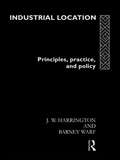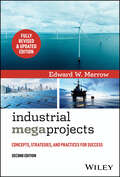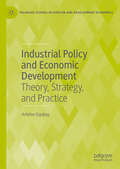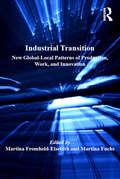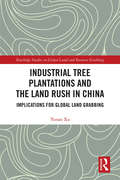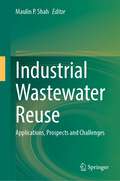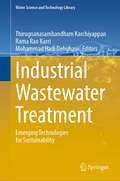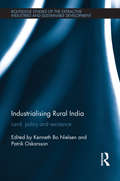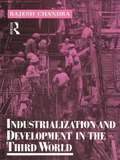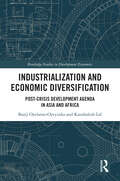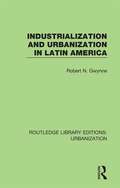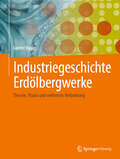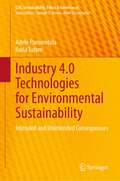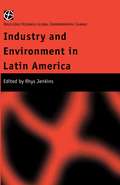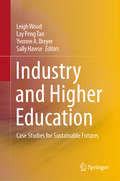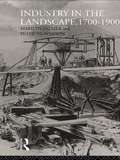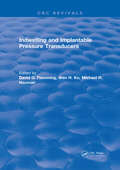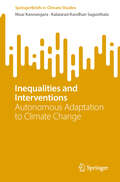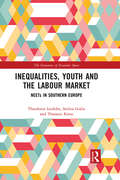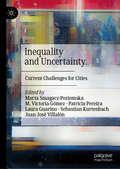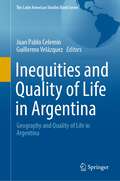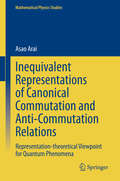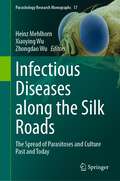- Table View
- List View
Industrial Location: Principles, Practice and Policy
by Barney Warf James W. HarringtonLocation is vital to the efficiency and profitability of industrial activity. Industrial Location presents a comprehensive introduction to and critical review of this field of growing academic and business interest. In business, the right choices have to be made to produce profit. Industrial location is a fixed investment, crucial to the strategy and capital investment of any organization. Location also impacts upon non-investors, directly affecting employment, the environment, and economic activity in the locale. Focusing chiefly on the United States, but drawing on an international range of cases, the authors explain the economic, social and political forces which have shaped comtemporary patterns of industrialization and examines the changing nature of production and systems.
Industrial Megaprojects: Concepts, Strategies, and Practices for Success
by Edward W. MerrowThe most up-to-date edition of the bestselling text on megaprojects In the newly revised second edition of Industrial Megaprojects Revisited: Concepts, Strategies, and Practices for Success, 2nd Edition , veteran megaproject valuator Edward Merrow delivers an accessible and authoritative discussion of why megaprojects frequently go over budget, past their deadlines, or result in safety compromises. You’ll explore project management deficiencies, destructive team dynamics, weak accountability systems, short-term biases, and technical expertise gaps and, more importantly, learn how to avoid or address these pitfalls in the real world. This latest edition offers extensive new material on renewable energy and decarbonization projects, as well as: Clear, nontechnical explanations of why major projects tend to get into trouble Strategies to avoid hazardous and costly errors in the high-stakes megaproject environment A comprehensive collection of tools, tips, principles, and frameworks to take a megaproject from start to finish without compromising on safety, blowing the budget, or exceeding the deadline An essential resource for engineers and industry professionals and executives, Industrial Megaprojects remains the gold standard on the subject. It also belongs in the libraries of finance and banking professionals who regularly fund these projects, and academics who research them.
Industrial Policy and Economic Development: Theory, Strategy, and Practice (Palgrave Studies in African and Development Economics)
by Arkebe OqubayThis book explores industrial policy and how it can drive economic development within emerging and developing countries. It examines the potential for sustainable economic growth and green industrialisation to deliver economic transformation and catch-up. The ways in which manufacturing can accelerate decarbonisation through the development of low-carbon industrial hubs, promote the expansion of renewable energy, and encourage investment in green technology and innovation are highlighted to show how industrial policy is key to achieving the net zero goals, the 2030 Agenda, and the Sustainable Development Goals. The links between industrial policy and urban transformation are also discussed to underline how cities can drive economic growth and foster technological innovation within the developing world. This book offers a framework for industrial policy and economic development that can be applied within emerging and developing economies, particularly in Africa. It will be relevant to students, researchers, and policymakers interested in development economics, industrial policy, and environmental economics.
Industrial Ruination, Community and Place
by Alice MahAbandoned factories, shipyards, warehouses, and refineries are features of many industrialized cities around the world. But despite their state of decline, these derelict sites remain vitally connected with the urban landscapes that surround them. In this enlightening new book, Alice Mah explores the experiences of urban decline and post-industrial change in three different community contexts: Niagara Falls, Canada/USA; Newcastle-upon-Tyne, UK; and Ivanovo, Russia.Employing a unique methodological approach that combines ethnographic, spatial, and documentary methods, Mah draws on international comparisons of the landscapes and legacies of industrial ruination over the past forty years. Through this, she foregrounds the complex challenges of living with prolonged uncertainty and deprivation amidst socioeconomic change. This rich comparative study makes an essential contribution to far-reaching debates about the decline of manufacturing, regeneration, and identity, and will have important implications for urban theory and policy.
Industrial Transition: New Global-Local Patterns of Production, Work, and Innovation (The Dynamics of Economic Space)
by Martina FuchsRecently, the international division of labour in industrial production has grown increasingly more volatile. The separation between 'high-end' tasks undertaken in the traditional core economies and 'low-end' tasks undertaken in newly emerging economies has become increasingly blurred. The new dynamics and unpredictability of actor and process configurations in internationalized production bring new challenges for research in economic geography, regional economics and management sciences. The allocation of R&D and production mandates within or between enterprises, the setting up, closing down, purchase or sale of subsidiaries at different localities, the shifting patterns of collaborative innovation, together with newly evolving forms of capitalism, all appear to interact in ways not seen before. It appears we have entered a new era termed 'industrial transition'. This book forms the first approach toward conceptualising the term and compiling illustrative empirical underpinnings. Contributions by an international set of renowned economic geographers highlight the major features and case studies of 'industrial transition' and address various questions that matter for the future of our global economy: How are regions and localities affected by the shift of product mandates? In which ways do changes differ between industrial sectors and economic regions? How can regions and localities adequately prepare for or react to foreseeable changes; and how can regional resilience and response capacities be built and enhanced?
Industrial Tree Plantations and the Land Rush in China: Implications for Global Land Grabbing (Routledge Studies in Global Land and Resource Grabbing)
by Yunan XuThis book analyses the political and economic causes, mechanisms and impacts of the industrial tree plantation boom in China. In the past two decades, the industrial tree plantation sector has been expanding rapidly in China, especially in Guangxi Province. Based on extensive primary data, this book concentrates on the political economy of the sector’s expansion with a focus on the recent and dramatic agrarian transformation involving the land-labour nexus, the impact on villagers’ livelihoods, the role of the state, and political reactions from below. The book questions the stereotypical portrayal of local communities as the excluded villager. Instead, it demonstrates that this is a much more complex issue with varying levels of passive and active forms of inclusion and exclusion within local communities. While most literature focuses on crop booms for food and biofuel production the industrial plantation sector has largely been overlooked, despite it being one of the biggest sectors in the current rush for land. Filling this lacuna, this book also reveals that while China has traditionally been painted as a major land grabber and consumer of crop booms it is also a destination of foreign investment. In doing so the book highlights how large-scale foreign land deals can also take place in traditional ‘grabber’ countries like China which feeds into the wider debates about global land politics and resource grabbing. This book will be of great interest to students and scholars of land grabbing, rural development and agrarian transformations, as well as Chinese development.
Industrial Wastewater Reuse: Applications, Prospects and Challenges
by Maulin P. ShahThis book identifies emerging technologies that allow the reuse and regeneration of industrial wastewater with innovative and applied approaches throughout the wastewater treatment cycle. Today, it is increasingly clear that treated urban wastewater, whose reuse has become an important component of long-term water management worldwide, is a key source of chemical pollutants and emerging biological concerns. Current water-quality guidelines for reclaimed wastewater predominantly address the risks associated with the presence of microbial organisms and chemical parameters such as biological oxygen demand, chemical oxygen demand, E. coli and worms, and in some cases heavy metals; however, they are insufficient for the full evaluation of risks. The global growth of population is concentrated in urban areas; therefore, most of the challenges and solutions related to wastewater reside in urban treatment plants. Unless wastewater management and wastewater governance processes are significantly improved within a decade, it is likely that our societies will face severe and prolonged water insecurity and urban floods.The application of sustainable technologies can eliminate or minimize micro-contaminants in wastewater. Several organizations focus on the potential impacts to humans and their environments by wastewater reuse. This book gathers new research and reviews work from researchers and scientists to identify the main barriers and limitations that will need to be overcome, so that wastewater reuse strategies gain more momentum and will be adopted more efficiently worldwide.The book is designed for engineers, scientists, and other professionals who are seeking an excellent introduction to and basic knowledge of the principles of environmental bioremediation technologies.
Industrial Wastewater Treatment: Emerging Technologies for Sustainability (Water Science and Technology Library #106)
by Thirugnanasambandham Karchiyappan Rama Rao Karri Mohammad Hadi DehghaniThis book provides an overview of recent advances in technologies for water treatment processes, such as green technology, nano-adsorbents, photocatalysts, advanced oxidation, membranes separation and sustainable technologies. Advances in membrane technology and fabrication process is presented in detail. Latest approaches like microbial treatment, electro chemical and solar energy-based treatment techniques were presented. Also, the use of sustainable and energy efficient approaches were discussed.· The book presents the negative impact of inorganic and organic pollutants on the natural environment and human health. It describes and discussing the advanced membrane technologies, novel green adsorbents, microbial treatment techniques, electro chemical and solar based removal techniques It also compares the most effective methods of removing toxic contaminants from water solutions with the use of sustainable and energy efficient approaches It also presents the life cycle assessment of emerging technologies in industrial wastewater treatment and desalination as well as presents the benchmarking of energy efficiency during treatment process
Industrialising Rural India: Land, policy and resistance (Routledge Studies of the Extractive Industries and Sustainable Development)
by Kenneth Bo Nielsen Patrik OskarssonRapid industrialisation is promoted by many as the most feasible way of rejuvenating the Indian economy, and as a way of generating employment on a large scale. At the same time, the transfer of land from rural communities and indigenous groups for industrial parks, mining, or Special Economic Zones has emerged as perhaps the most explosive issue in India over the past decade. Industrialising Rural India sheds light on crucial political and social dynamics that unfold today as India seeks to accelerate industrial growth. The volume examines key aspects that are implicated in current processes of industrialisation in rural India, including the evolution of industrial and related policies; the contested role of land transfers, dispossession, and the destruction of the natural resource base more generally; and the popular resistance against industrial projects, extractive industries and Special Economic Zones. Combining the work of scholars long established in their respective fields with the refreshing approach of younger scholars, Industrialising Rural India seeks to chart new ways in the study of contemporary industrialisation and its associated challenges in India. This cutting-edge interdisciplinary work will be of interest to scholars working on industrial development and land questions in India and South Asia alongside those with an interest in sociology , political science and development research.
Industrialization and Development in the Third World (Routledge Introductions to Development)
by Rajesh ChandraDeveloping countries have undergone significant industrialization in the last three decades. Yet industrial growth reveals marked spatial inequalities in terms of both country and location. The Newly Industrialised Countries have achieved spectacular growth in sharp contrast to many other countries of the South. Industrial structure has changed, moving away from labour intensive industries to more technologically advanced manufacturing. Developing countries have had considerable success in penetrating developed country markets but they are now encountering more market restrictions. The role of the government in the development of the economy is also changing. Increasingly, countries are turning towards export-orientated industrialization strategies and privatization whilst their governments are emphasising their facilitative role.
Industrialization and Economic Diversification: Post-Crisis Development Agenda in Asia and Africa (Routledge Studies in Development Economics)
by Banji Oyelaran-Oyeyinka Kaushalesh LalEconomic diversification entails a shift away from a single income source toward multiple income sources from an increasing spectrum of sectors and markets. A persistent concern for some Asian and African economies is their reliance on commodity exports and how they are exposed to the risk of export volatility and income instability. The Covid-19 pandemic and previous oil crashes have demonstrated the adverse impact on such economies. This book provides a systemic analysis of sustainable economic development through economic diversification. The book analyzes diversification and development experiences from comparative perspectives of Asia and Africa. It also investigates determinants of export diversification differentiated by commodities-dependence versus manufactured products and looks at the roles of various institutions and governance of institutions in export diversification. This book will provide policy insights into how different degrees of specialisation in exports across countries have affected outcomes in terms of living standards, economic growth and employment.
Industrialization and Urbanization in Latin America (Routledge Library Editions: Urbanization #4)
by Robert N GwynneOriginally published in 1985, Industrialization and Urbanization in Latin America focuses on the process of industrialisation in Latin America. The book links together the distinctive process of industrialisation to wider issues of urban and regional development in Latin America. The book looks in detail at the process of industrialisation in Latin America and the spatial ramifications in Latin American industrialisation; it argues that industrial growth and its geographical distribution is a principal cause of increasing disparities in income between regions within Latin American countries. This book will appeal to academics working in the field of urbanization and geography.
Industriegeschichte Erdölbergwerke: Theorie, Praxis und weltweite Verbreitung
by Günter BauerDieses Buch vereint umfassende Erfahrungen der Industriegeschichte zu Erdölbergwerken. Mit dieser außergewöhnlichen Sonderform der Erschließung wurde häufig sowohl die erste Entwicklungsstufe der Erdölgewinnung als auch eine nachhaltige Möglichkeit zur Ausbeutung eines Reservoirs ohne teure Zusatzmaßnahmen realisiert. Trotz einheitlichen Gewinnungsprinzips können Erdölbergwerke völlig unterschiedlich ausgestaltet sein, bedingt durch Anpassung des Grubengebäudes an die jeweilige Lagerstätte. Im Buch sind in eimaliger Weise die relevanten (geologischen, ingenieurtechnischen und wirtschaftlichen) Grundlagen herausgearbeitet und ältere wie auch modernere Erdölbergwerke erfasst und in wichtigsten Aspekten beschrieben.
Industry 4.0 Technologies for Environmental Sustainability: Intended and Unintended Consequences (CSR, Sustainability, Ethics & Governance)
by Adele Parmentola Ilaria TutoreIndustry 4.0 technologies are expected to have a positive impact on the global economy by promoting autonomous interoperability, agility, flexibility, decision-making, efficiency or cost reduction, which are also expected to be resource efficient. However, new and emerging technologies can also have potentially harmful social and environmental impacts that must be considered.The goal of this book is to provide a deeper understanding of how Industry 4.0 technologies can benefit or harm the environmental sustainability of companies. To this end, it presents a classification of Industry 4.0 technologies and evaluates for each typology the positive and negative aspects of their implementation. Thus, the book considers Industry 4.0 technology and environmental sustainability from the perspective of management on the one hand and from the perspective of technology users on the other. The book is of interest to researchers from various disciplines who approach Industry 4.0 technologies from a business perspective, and on the other hand to managers and strategic consultants who want to promote sustainable change in their companies.
Industry Genius: Inventions and People Protecting the Climate and Fragile Ozone Layer
by Stephen Andersen Durwood ZaelkeThis book presents the inventive genius behind technological breakthroughs by ten global companies including Alcoa, DaimlerChrysler, Honda, ST Micro and Visteon. Readers will gain understanding and insight into how cutting-edge technology is helping protect the climate and/or the ozone layer, while contributing to the company's bottom line. Each chapter chronicles the challenge and triumph of invention, introduces the engineers and executives who overcome conventional wisdom, and demonstrates the contribution these companies are making to environmental protection. In full colour and crammed with graphics to illustrate the creative process of technological breakthroughs, the book is accessible and informative. The genius of these ten companies will inspire the engineer, the policy-maker, the student, the environmentalist, the CEO and the investor alike.
Industry and Environment in Latin America (Routledge Research in Global Environmental Change)
by Rhys JenkinsThe impact of globalisation on the environment is a much debated issue, reflected in the growing literature on the effects of trade liberalization, the activities of transnational corporations and international finance. Using case-studies from Latin America, this book sets out these debates and presents new empirical evidence on key questions.
Industry and Higher Education: Case Studies for Sustainable Futures
by Yvonne A. Breyer Leigh Wood Lay Peng Tan Sally HawseThis book is aimed at business schools around the globe. We offer rich case studies, teaching notes and assessment ideas to help business educators embed sustainability in curriculum. These international case studies are situated in Mauritius, Malaysia, Indonesia, Australia and India however they have global applicability. Each chapter is a joint creation with an industry or government partner and uses original research written in the form of a case study.Active learning through case studies opens opportunities to change attitudes and to find creative solutions. In this book, we present ten chapters written as case studies covering a diverse number of sustainability topics – from tourism, health care, human resource management, climate change and supply chain management. Each case study is accompanied by detailed teaching notes and assessment questions as well as marking guides. There are also two chapters discussing sustainability discourse and discipline in higher education. The detailed cases can be immediately applied in the classroom.
Industry in the Landscape, 1700-1900 (History Of The British Landscape Ser.)
by Peter Neaverson Marilyn PalmerTwo hundred years of industry have transformed the British landscape. This book enables the reader to reconstruct the landscape of past industry. The authors are industrial archaeologists of national standing whose concern is to use surviving material evidence and contemporary sources to study the former working conditions of men and women. Comprehensive in coverage, the book examines fuels, metals, clothing, food, building and transport. It makes clear the tangible elements which form the basis for recreation of past landscapes and demonstrates both their function and the context in which they should be considered.
Indwelling and Implantable Pressure Transducers
by D.G. FlemmingIn the first two chapters of this book there is information about the needs and potential applications of indwelling transducers both present and past, and will go into detail about many topics such as the fundaments of blood pressure transducers, studies of the intestinal motility and clinical aspects of cardiovascular pressure measurements. Chapters 3, 4 & 5 explain and give information on manufacturers considerations of indwelling pressure transducer, specifications of commercial pressure transducers. Research and development of indwelling pressure transducer, explaining the principles of pressure transducer, biomedical applications. And then they move onto future directions for implant pressure transducers and the users point of view. This book covers a wide spectrum on indwelling pressure transducers.
Inequalities and Interventions: Autonomous Adaptation to Climate Change (SpringerBriefs in Climate Studies)
by Nisar Kannangara Kalaiarasi Kandhan SagunthalaThis book represents an original investigation employing a multidisciplinary approach to elucidate autonomous adaptation, which denotes the spontaneous responses of individuals and communities to mitigate the impacts and seize the opportunities arising from climate change in Indian contexts. It systematically examines the diverse socio-political and economic transformations precipitated by ecological shifts in villages situated across varied terrains in the Kozhikode district of Kerala, renowned as one of India's most vulnerable regions to climate change variables. Through meticulous analysis, it delineates the intricate interplay of inequality at interpersonal and communal levels within the framework of autonomous adaptation, elucidating how it catalyzes multifaceted transformations across different strata of society. Utilizing a mixed-method approach, the study integrates the analysis of district-wise meteorological data spanning over three decades with a year-long ethnographic field study conducted in three distinct villages of Kozhikode—a fishing village on the coast, an agrarian village on the plain, and a village on the Western Ghats primarily depending on plantation crops. The book provides comprehensive visual aids, including maps illustrating the varying degrees of climate change exposure across different districts in India. Furthermore, it incorporates oral history accounts, grassroots narratives, and scientific analyses to illustrate how climate-induced ecological transformations manifest differently across diverse terrains, resulting in both convergent and divergent forms of societal change. This scholarly endeavor is poised to offer invaluable insights to a wide spectrum of stakeholders, including the general public, academic scholars, and policymakers. By illuminating the ground realities of climate change impacts and elucidating the shortcomings of existing adaptation policies, the book aims to enhance collective understanding and spur informed action in addressing the pressing challenges posed by climate change. Through its rigorous analysis and accessible presentation, it serves as a critical resource for fostering evidence-based decision-making and advancing effective climate change adaptation strategies.
Inequalities, Youth and the Labour Market: NEETS in Southern Europe (The Dynamics of Economic Space)
by Theodoros Iosifides Stelios Gialis Thanasis KizosThis book thoroughly examines the socio-economic and labour market paths of young NEETs, particularly migrants and women, in the disadvantaged regions of Mediterranean Southern Europe – specifically, the island, coastal and peripheral areas of Greece, Cyprus, Italy and Spain.
Inequality and Uncertainty: Current Challenges for Cities
by Sebastian Kurtenbach Marta Smagacz-Poziemska M. Victoria Gómez Patrícia Pereira Juan José Villalón Laura GuarinoIt is not possible to ignore the fact that cities are not only moving, vibrant and flourishing spaces, promising hope for better quality of life, but that they also accumulate and reflect significant problems. This book explores the relational and dynamic nature of urban inequalities, including their visible and invisible forms. By using the rather elusive term of ‘uncertainty’, the authors zoom in on specific aspects of urban inequalities that are difficult to measure, yet are acutely sensed and experienced by people and, more and more often, perceived as unfair. Here, in the recognition of inequalities as unjust and in the disagreement with the status quo, lies a positive aspect of uncertainty, which can lead to a social awakening and more active citizenship.
Inequities and Quality of Life in Argentina: Geography and Quality of Life in Argentina (The Latin American Studies Book Series)
by Juan Pablo Celemin Guillermo VelázquezThe basis of this proposal is the study of quality of life from an interdisciplinary perspective. This volume presents a set of contributions from different sciences that analyse the quality of life in Argentina. The contributions come from the social disciplines (Geography, Economics, Demography, History) and from the field of health (Nutrition, Medicine, Psychology) as well as the applied sciences (Statistics, Applied Mathematics). The purpose is to present various dimensions related to the well-being of the population, particularly in relation to poverty, human development, health, nutrition and morbidity. Although there are works from different sciences associated with the object of study, they all have a geographic component based on cartography. Consequently, the importance of geography is highlighted, as the territorial base allows for the study quality of life from a unique perspective where the map emerges as a fundamental descriptive tool. Such an approach is useful to diagnose the quality of life and its uneven spatial distribution, either through index or different associated variables. Thus, the maps are fundamental to study the territorial configuration of the quality of life at the different scales of analysis, showing spatial inequalities and the areas where it is necessary to take measures to improve the population's living conditions.
Inequivalent Representations of Canonical Commutation and Anti-Commutation Relations: Representation-theoretical Viewpoint for Quantum Phenomena (Mathematical Physics Studies)
by Asao AraiCanonical commutation relations (CCR) and canonical anti-commutation relations (CAR) are basic principles in quantum physics including both quantum mechanics with finite degrees of freedom and quantum field theory. From a structural viewpoint, quantum physics can be primarily understood as Hilbert space representations of CCR or CAR. There are many interesting physical phenomena which can be more clearly understood from a representation–theoretical viewpoint with CCR or CAR. This book provides an introduction to representation theories of CCR and CAR in view of quantum physics. Particular emphases are put on the importance of inequivalent representations of CCR or CAR, which may be related to characteristic physical phenomena. The topics presented include general theories of representations of CCR and CAR with finite and infinite degrees of freedom, the Aharonov–Bohm effect, time operators, quantum field theories based on Fock spaces, Bogoliubov transformations, and relations of infinite renormalizations with inequivalent representations of CCR. This book can be used as a text for an advanced topics course in mathematical physics or mathematics.
Infectious Diseases along the Silk Roads: The Spread of Parasitoses and Culture Past and Today (Parasitology Research Monographs #17)
by Heinz Mehlhorn Zhongdao Wu Xiaoying WuThe heart of this volume is exploring the links between human disease spread and the broad Silk Road trading networks which connect Eurasian civilizations past and today. Compiled by an international team of subject authors, this book includes two themed parts. Readers are first introduced into history naming, former, present and future routes of the Silk Road, representing the longest trade way and culture diffuser in the world. The second part contains the main book focus and addresses medical research as well as individual diseases and parasite groups from the region in detail. By drawing an arc between the past and present disease situation, the authors trace how parasites and vectors spread around the globe, and what impact infectious diseases had and will have upon human civilizations.Through its interdisciplinary character this book will be enjoyed by interested readers from the fields of parasitology and palaeoparasitology, medical sciences and public health, as well as cultural history.
